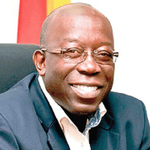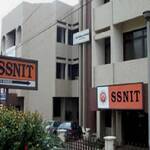Director General of the Social Security and National Insurance Trust (SSNIT), Kofi Bosompem Osafo-Maafo, has refuted allegations made by former National Chairman of the New Patriotic Party (NPP), Freddy Blay, that SSNIT rejected a $150 to $200 million bid by his son’s company to acquire a 60% stake in its hotels.
At a media briefing on SSNIT’s operations, he clarified that the technical proposal submitted by Spartan Ives, the company in question, did not pass the initial evaluation stage of the bid process.
Osafo-Maafo emphasized that the financial proposal from Spartan Ives was never opened or assessed due to their failure to meet the technical requirements.
He stated, “The claim made by Mr. Freddy Blay that his son’s company, Spartan Ives, bid $150 to $200 million and SSNIT turned it down cannot be substantiated.
The technical proposal submitted by Spartan Ives was evaluated by our panel and scored below the required 50% pass mark. Therefore, their financial proposal was not assessed, and the envelope containing it was returned to them unopened.”
Osafo-Maafo elaborated on the bid process, explaining that it involves an evaluation panel that first assesses the technical proposal and assigns a score.
Only if the technical proposal meets the required pass mark does the panel proceed to evaluate the financial proposal. “We adhered strictly to the process as required by law.
Spartan Ives did not meet the technical criteria, and hence, their financial proposal was never considered,” he reiterated.
“To say that SSNIT received an offer of $150 to $200 million and turned it down is inaccurate because the offer was never made, and the financial proposal was never opened,” he stressed.
The SSNIT Director General also refuted claims that it incurred a loss in the sale of its 25% stake in the Grand Regency Hotel, previously known as the Kumasi Catering Guesthouse, emphasizing that the sale was profitable and conducted with transparency.
He explained that the valuation of SSNIT’s stake was independently conducted by the Ghana Institute of Surveyors, setting the value at GH₵6.684 million.
The stake was subsequently sold to Rock City Hotel for GH₵7.4 million, resulting in a gain for SSNIT.
“We made a gain in that sale,” he stated, addressing allegations that SSNIT had lost value in the negotiations.
“It was not an internal valuation by SSNIT; it was done independently.
“Towards the end of 2021, the valuation for our 25% stake was GH₵6.684 million, and we sold it for GH₵7.4 million. This implies there was a gain of approximately GH₵716,000 on the sale when compared to the valuation,” he added.
Osafo-Maafo also commented on the nature of negotiations, explaining that initial asking prices in negotiations are typically higher, with the final sale price landing at a mutually acceptable figure.
“In any negotiation, you start from a higher figure and aim to reach an acceptable final price. That’s exactly what we did, and it resulted in a profit,” he elaborated. He assured stakeholders that the sale process was transparent and conducted in the best interest of the Trust.
“I presume if most of you are selling your houses or your cars, you wouldn’t start with a low figure. You begin with a higher figure and negotiate to an acceptable price. We applied the same principle and achieved a gain on the sale,” Osafo-Maafo concluded.
The press briefing was held to address concerns surrounding the sale of SSNIT’s 60% stake in some six hotels.
Five out of the six hotels the SSNIT is planning to offload 60% of shares to a private company have not paid the debt owed SSNIT to date.
They have not paid dividends in the past five years. Dividends are often expected by shareholders as a reward for their investment in a company.
With the exception of Labadi Beach Hotel, none of the hotels can fund maintenance capex, and the additional periodic significant investment capex needed.
Documents revealed that only Labadi Beach Hotel has paid a total of GH₵48.1 million (GH₵48,128,821) in the last five years.
The rest—La Palm Royal Beach Hotel, Elmina Beach Resort, Busua Beach Resort, Ridge Royal Hotel, and Trust Lodge—did not pay any dividends during this period.
More disturbing is the fact that SSNIT made total payments, including shareholder loans of GH₵233.8 million in respect of La Palm, Elmina, and Busua.
However, the Trust has made no return on equity in the form of dividends on this amount, and none of the loans have been serviced.
The Director General disclosed that La Palm had made losses in 11 out of the past 14 years.
According to him, “the hotel hasn’t been profitable, has not paid us any dividend and again, they are struggling.
Average return is -4.2% in the period preceding the decision to divest our 60% stake.
The situation of Elmina, is not different.
The facility had made losses in nine out of the last 14 years, had paid SSNIT no dividend, the investment put in had failed to earn the Trust any return.
The average Return on Equity for Elmina Beach Resort is -4.8% for the period 2010 to 2017.
No dividends had been received from Busua Beach Resort, rather losses had been recorded in most of the years, and returns negative.
The average Return on Equity for Busua Beach Resort was -31.7% for the period 2010 to 2017.
The predication of Ridge Royal Hotel is similar to the other hotels. No profits had been reported, rather it had made losses in nine years of its operation.
“The average Return on Equity for Ridge Royal Hotel was -33.1% for the period 2016 and 2017 and has had a negative shareholders equity position since,” Mr. Osafo-Maafo said.
He revealed that “the hotel owes us GH₵44 million in the investment that we put into the hotel. And none of that has been serviced. So again, just put that into perspective.
The hotel had made losses in two out of the last 14 years, had paid dividends in the last two years, but the returns had been low.
According to the Director General, the average Return on Investment for Labadi Beach Hotel was 1.7% (2012-2017), averaging 5.2% for the period 2012 and 2022.
- Commonwealth lawyers demand reversal of CJ’s suspension - 10 May 2025
- Cedi to resume depreciation in late 2025, S&P warns - 10 May 2025
- Debt restructuring, IMF deal, gold surge propel Ghana to S&P Upgrade - 10 May 2025




